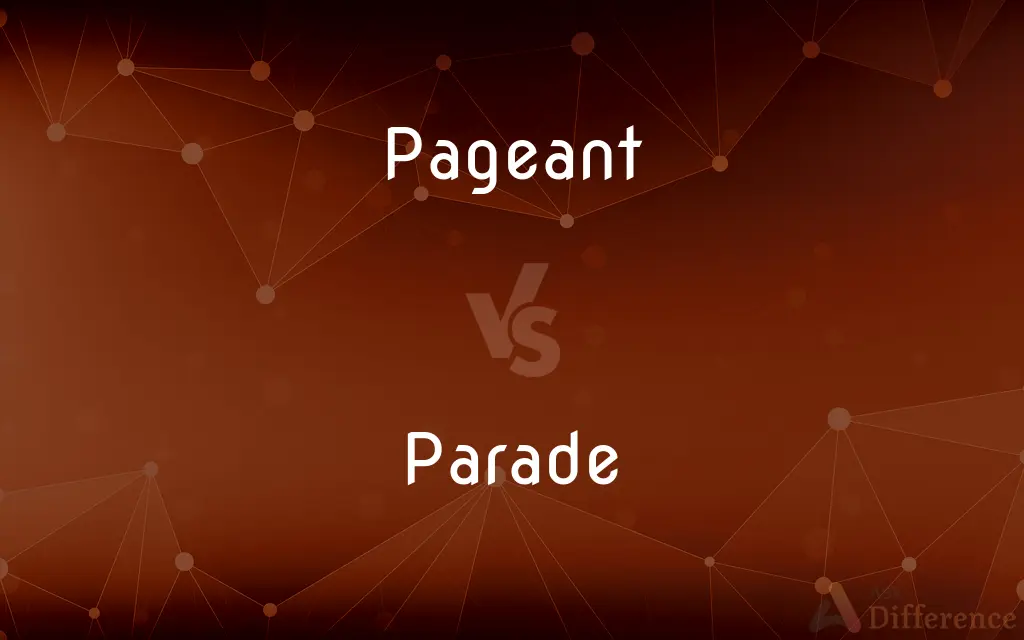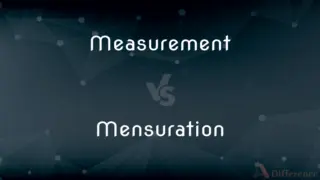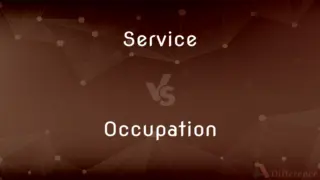Pageant vs. Parade — What's the Difference?

Difference Between Pageant and Parade
ADVERTISEMENT
Compare with Definitions
Pageant
An elaborate public dramatic presentation that usually depicts a historical or traditional event.
Parade
A parade is a procession of people, usually organized along a street, often in costume, and often accompanied by marching bands, floats, or sometimes large balloons. Parades are held for a wide range of reasons, but are usually celebrations of some kind.
Pageant
A spectacular procession or celebration, especially one involving costumed performers or contestants.
Parade
An organized public procession on a festive or ceremonial occasion.
Pageant
A beauty contest.
ADVERTISEMENT
Parade
The participants in such a procession.
Pageant
A usually pompous or ostentatious display or sequence
"[She] looks on at the pageant of make-believe affections.
Parade
A regular place of assembly for reviews of troops. Also called parade ground.
Pageant
An elaborate public display, especially a parade in historical or traditional costume.
Parade
A formal review of marching military troops.
Pageant
A spectacular ceremony.
Parade
The troops taking part in such a review.
Pageant
Ellipsis of beauty pageant.
Parade
A line or extended group of moving persons or things
A parade of strollers on the mall.
Pageant
(obsolete) A wheeled platform for the exhibition of plays, etc.
Parade
An extended, usually showy succession
A parade of fads and styles.
Pageant
To exhibit in show; to represent; to mimic.
Parade
An ostentatious show; an exhibition
Make a parade of one's talents.
Pageant
A theatrical exhibition; a spectacle.
To see sad pageants of men's miseries.
Parade
A public square or promenade.
Pageant
An elaborate exhibition devised for the entertainmeut of a distinguished personage, or of the public; a show, spectacle, or display.
The gaze of fools, and pageant of a day!
We love the man, the paltry pageant you.
Parade
To take part in a parade; march in a public procession
The circus performers and animals paraded down Main Street.
Pageant
Of the nature of a pageant; spectacular.
Parade
To assemble for a ceremonial military review or other exercise.
Pageant
To exhibit in show; to represent; to mimic.
Parade
To stroll in public, especially so as to be seen; promenade.
Pageant
An elaborate representation of scenes from history etc; usually involves a parade with rich costumes
Parade
To behave so as to attract attention; show off.
Pageant
A rich and spectacular ceremony
Parade
To cause to take part in a parade
Paraded the floats past city hall.
Parade
To assemble (troops) for a ceremonial review.
Parade
To march or walk through or around
Parade the campus.
Parade
To exhibit ostentatiously; flaunt
Paraded their wealth.
Parade
An organized display of a group of people, particularly
Parade
(military) military parade: A show of troops, an assembly of troops as a show of force, to receive orders, or especially for inspection at set times.
Parade
A public procession, especially one commemorating a holiday or special event or (dated) in protest.
Thanksgiving Day parade
Ticker-tape parade
Parade
Synonym of gaggle: A group of geese when on the move, particularly a line of goslings shepherded by one or more adults.
Parade
Synonym of herd: A group of elephants when on the move.
Parade
A place reserved for such displays, particularly
Parade
Synonym of parade ground: A place specially designated for such displays or for practicing close-order drills.
Parade
(dated) promenade: A route, street, or square frequented by pedestrians or formerly used for military parades.
Parade
(uncommon) road, used in place names.
His shop is located in Chester Pde.
Parade
The people who make up such a display, particularly
Parade
The body of soldiers thus assembled.
Parade
The body of promenaders thus assembled.
Parade
(figurative) show: any similarly orderly or ostentatious display, especially of a variety of people or a series of things paraded around.
The dinner was a parade of courses, each featuring foods more elaborate than the last.
Parade
A row of shops beside a street.
Parade
: a description of the programming schedule formerly announced on the radio and various television channels.
Parade
(uncommon) parry in both its literal and figurative senses.
Parade
(intransitive) To take part in a parade, particularly
Parade
To assemble for inspection, to receive orders, etc.
Parade
To march impressively or ostentatiously.
No one fights a war in close-order formations any more but officers still love to force their men to parade, coming up with various plausible excuses for their enjoyment of command.
Parade
(transitive) To march past.
After the field show, it is customary to parade the stands before exiting the field.
Parade
(transitive) To march through or along.
Parade
(figurative) promenade: to walk up and down, especially in public in order to show off and be seen by others.
Parade
To move slowly through or among.
Parade
To walk in a row led by one parent, often trailed by the other.
Parade
(transitive) To cause to take part in a parade, particularly
Parade
To assemble soldiers for inspection, to receive orders, etc.
Parade
(figurative) show off: to display or reveal prominently or ostentatiously, especially in a kind of procession.
They paraded dozens of fashions past the crowd.
Parade
To furnish with a parade or parades.
Parade
The ground where a military display is held, or where troops are drilled. Also called parade ground.
Parade
An assembly and orderly arrangement or display of troops, in full equipments, for inspection or evolutions before some superior officer; a review of troops. Parades are general, regimental, or private (troop, battery, or company), according to the force assembled.
Parade
Any imposing procession; the movement of any group of people marshaled in military order, especially a festive public procession, which may include a marching band, persons in varied costume, vehicles with elaborate displays, and other forms of entertainment, held in commemoration or celebration of an event or in honor of a person or persons; as, a parade of firemen; a Thanksgiving Day parade; a Memorial Day parade; a ticker-tape parade.
In state returned the grand parade.
Parade
A pompous show; a formal or ostentatious display or exhibition.
Be rich, but of your wealth make no parade.
Parade
Posture of defense; guard.
When they are not in parade, and upon their guard.
Parade
A public walk; a promenade.
Parade
To exhibit in a showy or ostentatious manner; to show off.
Parading all her sensibility.
Parade
To assemble and form; to marshal; to cause to maneuver or march ceremoniously; as, to parade troops.
Parade
To make an exhibition or spectacle of one's self, as by walking in a public place.
Parade
To assemble in military order for evolutions and inspection; to form or march, as in review or in a public celebratory parade{3}.
Parade
A ceremonial procession including people marching
Parade
An extended (often showy) succession of persons or things;
A parade of strollers on the mall
A parade of witnesses
Parade
A visible display;
She made a parade of her sorrows
Parade
Walk ostentatiously;
She parades her new husband around town
Parade
March in a procession;
The veterans paraded down the street
Share Your Discovery

Previous Comparison
Measurement vs. Mensuration
Next Comparison
Service vs. Occupation














































